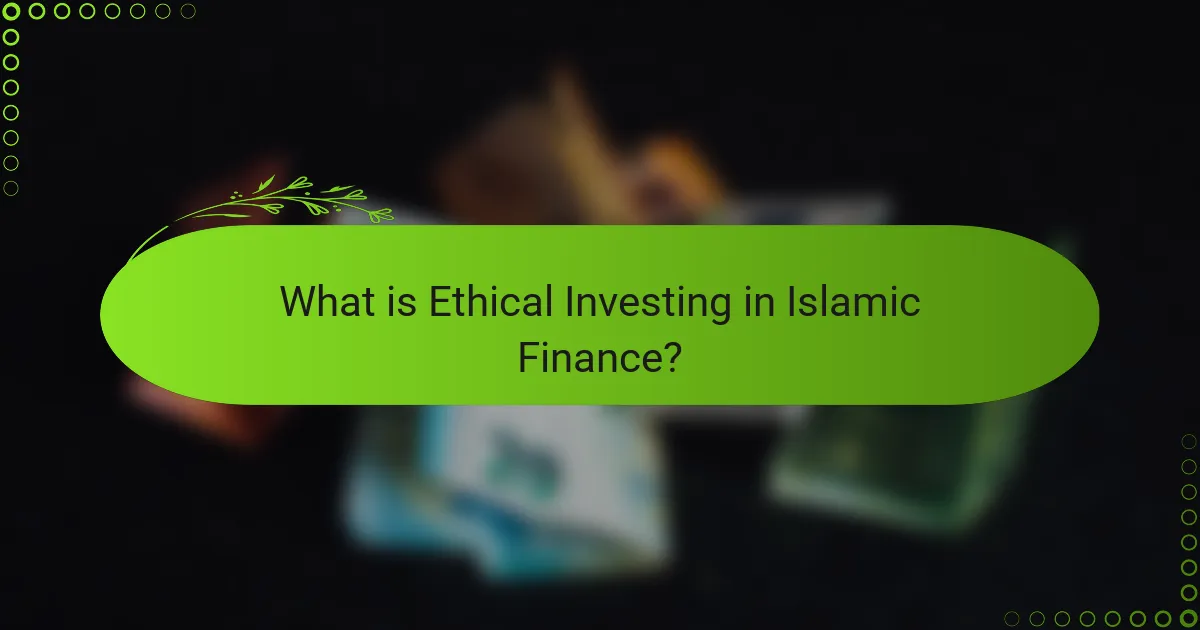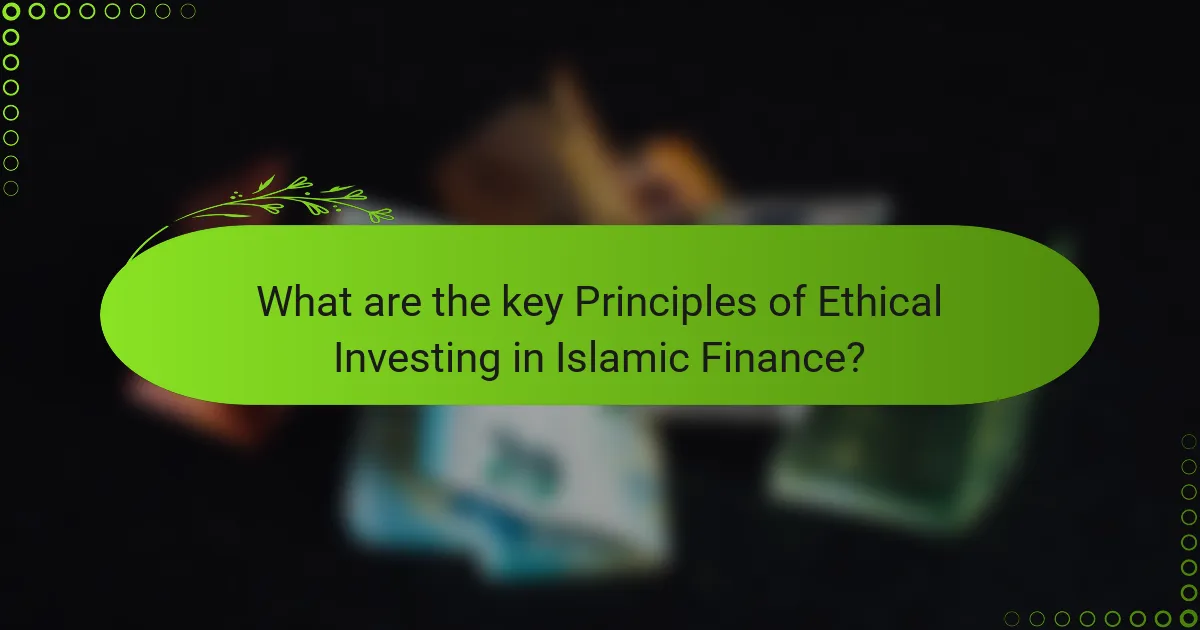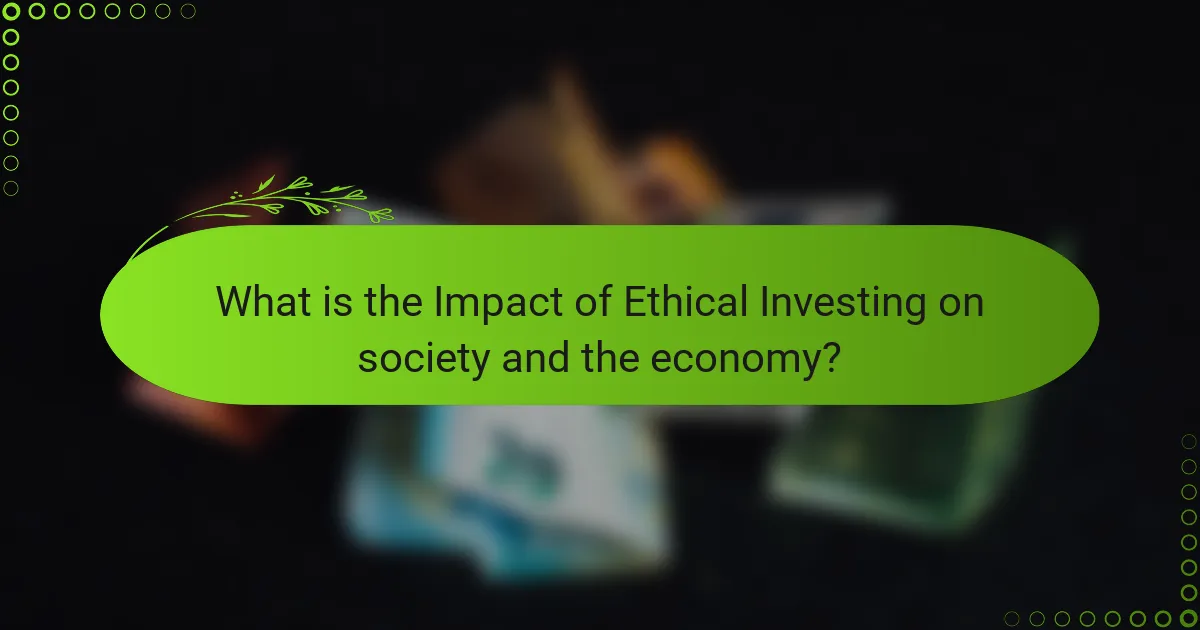
What is Ethical Investing in Islamic Finance?
Ethical investing in Islamic finance refers to investment practices that comply with Sharia law. This approach emphasizes socially responsible and ethical considerations in financial transactions. Investments must avoid industries such as alcohol, gambling, and usury, which are deemed haram, or forbidden. Instead, ethical investing focuses on sectors that promote social welfare and economic development. This method aligns financial growth with moral and ethical values. According to the Accounting and Auditing Organization for Islamic Financial Institutions (AAOIFI), ethical investing is integral to Islamic finance principles. It promotes fairness, transparency, and accountability in financial dealings.
How does Ethical Investing align with Islamic Principles?
Ethical investing aligns with Islamic principles by adhering to Sharia law, which prohibits investments in haram (forbidden) activities. These activities include alcohol, gambling, and interest-based financial transactions. Islamic finance emphasizes risk-sharing and ethical conduct in business. It promotes investments that contribute positively to society and the economy.
For instance, ethical investing encourages social justice and environmental sustainability. This aligns with the Islamic principle of stewardship (Khilafah), which advocates for responsible management of resources. Furthermore, many Islamic financial institutions screen investments to ensure compliance with these ethical standards. This practice supports the notion of halal (permissible) investing, which is essential in Islamic finance.
Studies show that ethical investing can enhance financial performance while adhering to these principles. Research indicates that Islamic-compliant investments often outperform their conventional counterparts over the long term. Thus, ethical investing not only aligns with Islamic principles but also supports sustainable economic growth.
What are the core tenets of Islamic Finance that support Ethical Investing?
The core tenets of Islamic Finance that support Ethical Investing include the prohibition of riba, gharar, and haram activities. Riba refers to interest or usury, which is strictly forbidden. This principle encourages profit-sharing and risk-sharing investments. Gharar denotes excessive uncertainty or ambiguity in contracts, promoting transparency and fairness. Investments must be based on tangible assets or services, ensuring ethical engagement. Furthermore, Islamic Finance emphasizes social justice and community welfare. Investments should contribute positively to society, aligning with ethical values. These tenets collectively foster a financial system rooted in ethical principles, promoting responsible investing.
How do Shariah-compliant investments differ from conventional investments?
Shariah-compliant investments differ from conventional investments primarily in adherence to Islamic law. Shariah law prohibits investments in industries such as alcohol, gambling, and pork. Additionally, Shariah-compliant investments must avoid excessive uncertainty (gharar) and interest (riba). Conventional investments do not have these restrictions and can include any industry.
Shariah-compliant investments often involve profit-sharing models, such as mudarabah and musharakah. These models promote risk-sharing between investors and entrepreneurs. In contrast, conventional investments typically focus on fixed returns.
The screening process for Shariah compliance involves specific guidelines set by scholars. This ensures that investments align with ethical and moral values. Conventional investments do not require such scrutiny and can prioritize profit maximization alone.
Why is Ethical Investing important in today’s financial landscape?
Ethical investing is important in today’s financial landscape because it aligns financial goals with social responsibility. Investors increasingly seek to support companies that prioritize environmental sustainability, social justice, and good governance. A 2021 report by the Global Sustainable Investment Alliance revealed that sustainable investing reached $35.3 trillion, representing a 15% increase over two years. This trend reflects a growing awareness of the impact of investments on society and the environment. Ethical investing also helps mitigate risks associated with companies involved in unethical practices. Investors are more likely to avoid firms facing regulatory scrutiny or reputational damage. Furthermore, ethical investments often yield competitive financial returns, proving that social responsibility and profitability can coexist.
What role does Ethical Investing play in promoting social responsibility?
Ethical investing plays a crucial role in promoting social responsibility by aligning financial decisions with moral values. It encourages investors to consider the societal and environmental impacts of their investments. This approach fosters accountability among companies to act responsibly. Ethical investing often supports businesses that prioritize sustainability and ethical practices. Research indicates that companies with strong ethical standards tend to perform better financially in the long run. For instance, a 2020 study by the Global Sustainable Investment Alliance reported that sustainable investments reached $30.7 trillion globally. This demonstrates a growing trend toward prioritizing social responsibility in investment strategies.
How does Ethical Investing impact economic development and sustainability?
Ethical investing positively impacts economic development and sustainability by directing capital towards socially responsible projects. This investment approach encourages businesses to adopt sustainable practices. It fosters innovation in green technologies and renewable energy. Ethical investing also promotes fair labor practices and community development. According to the Global Sustainable Investment Alliance, global sustainable investment reached $35.3 trillion in 2020. This figure represents a 15% increase from 2018, illustrating growing investor interest. As more funds flow into ethical ventures, it stimulates economic growth in underserved areas. This creates jobs and enhances social equity. Ultimately, ethical investing aligns financial returns with positive societal outcomes.

What are the key Principles of Ethical Investing in Islamic Finance?
The key principles of ethical investing in Islamic finance are based on Shariah law. These principles include the prohibition of riba, or interest, which is considered exploitative. Investments must also avoid haram activities, such as gambling, alcohol, and pork. Ethical investing emphasizes risk-sharing and profit-sharing arrangements. Transparency and fairness in transactions are essential components. Additionally, ethical investments should contribute to social welfare and avoid harm to society. These principles ensure that investments align with moral and ethical standards in Islamic teachings.
What is the significance of the prohibition of Riba (usury) in Ethical Investing?
The prohibition of Riba (usury) is significant in ethical investing as it promotes fairness and justice in financial transactions. Riba is viewed as exploitative, leading to inequality and social injustice. By prohibiting Riba, ethical investing aligns with Islamic principles that prioritize the welfare of the community. This prohibition encourages investment in ventures that generate real economic value rather than merely profiting from interest. It fosters risk-sharing and partnership models, which enhance accountability. Historical context shows that societies adhering to these principles often experience more equitable wealth distribution. Thus, the prohibition of Riba underpins the ethical framework of Islamic finance, ensuring investments contribute positively to society.
How does the concept of Gharar (uncertainty) affect investment choices?
The concept of Gharar refers to excessive uncertainty in transactions. It significantly affects investment choices in Islamic finance. Investments that involve Gharar are generally prohibited. This prohibition encourages transparency and risk-sharing in financial dealings. For instance, investors prefer contracts that clearly define terms and conditions. This leads to more ethical and responsible investment practices. The emphasis on avoiding uncertainty aligns with the principles of Islamic finance. Thus, Gharar shapes investment choices by promoting clarity and fairness in financial transactions.
Why is investing in Halal (permissible) businesses essential?
Investing in Halal businesses is essential for aligning financial activities with Islamic principles. Halal investments adhere to Sharia law, which prohibits unethical practices such as usury and gambling. This alignment fosters ethical financial growth and supports businesses that contribute positively to society. Additionally, the global Halal market is projected to reach $9.71 trillion by 2025, demonstrating significant economic potential. Investing in Halal businesses promotes sustainable practices and enhances community welfare. It also provides investors with peace of mind, knowing their funds are used in permissible and ethical ways.
How does the principle of Zakat influence Ethical Investing?
The principle of Zakat significantly influences ethical investing by promoting social responsibility and wealth redistribution. Zakat requires Muslims to donate a portion of their wealth to those in need. This obligation encourages investors to consider the social impact of their investments. Ethical investing aligns with Zakat by prioritizing investments that benefit society and avoid harm. For example, investments in sustainable businesses support community welfare. Additionally, Zakat fosters a mindset of accountability among investors. They are motivated to ensure their investments contribute positively to society. This principle shapes investment strategies that align with Islamic values and ethical standards. Thus, Zakat reinforces the importance of ethical considerations in investment decisions.
What are the implications of Zakat on wealth distribution in Islamic finance?
Zakat significantly impacts wealth distribution in Islamic finance. It is a mandatory form of almsgiving, representing a percentage of wealth that Muslims must donate annually. Typically, Zakat is set at 2.5% of an individual’s savings. This practice redistributes wealth from the affluent to the less fortunate. Studies show that Zakat helps alleviate poverty by providing financial support to those in need. It fosters social equity and reduces income inequality within the community. By mandating charitable contributions, Zakat encourages a culture of giving. This mechanism promotes economic stability and social welfare in Islamic societies.
How can investors incorporate Zakat into their investment strategies?
Investors can incorporate Zakat into their investment strategies by allocating a portion of their profits to charitable giving. This allocation typically amounts to 2.5% of their wealth annually. Investors should calculate their Zakat based on their net assets, including cash, investments, and other assets. They can set aside this amount before making further investments. By doing so, they align their financial goals with their ethical and religious obligations. This practice not only benefits the community but also purifies their wealth. Historical practices of Zakat demonstrate its role in wealth redistribution in Islamic societies. Incorporating Zakat can enhance an investor’s ethical reputation and attract like-minded investors.

What Practices exemplify Ethical Investing in Islamic Finance?
Ethical investing in Islamic finance is exemplified by practices such as Shariah compliance, risk-sharing, and socially responsible investing. Shariah compliance ensures that investments do not involve prohibited activities like alcohol or gambling. Risk-sharing promotes fairness and equity in financial transactions. Socially responsible investing focuses on projects that contribute positively to society. These practices align with Islamic principles that emphasize justice and ethical behavior in financial dealings. Evidence of these practices can be found in various Islamic financial institutions that adhere to these guidelines, ensuring their products meet ethical standards.
What are the common methods used in Ethical Investment strategies?
Common methods used in ethical investment strategies include negative screening, positive screening, and impact investing. Negative screening involves excluding companies or sectors that do not align with ethical standards, such as those involved in tobacco or weapons. Positive screening focuses on selecting companies that demonstrate strong environmental, social, and governance (ESG) practices. Impact investing targets investments that generate measurable social or environmental benefits alongside financial returns. These methods are widely adopted in ethical investment to ensure alignment with moral values and social responsibility.
How do Islamic mutual funds operate under Ethical Investing guidelines?
Islamic mutual funds operate under Ethical Investing guidelines by adhering to Shariah principles. These funds avoid investments in businesses involved in alcohol, gambling, and interest-based financial services. They focus on ethical sectors such as healthcare, technology, and renewable energy. Shariah boards oversee fund compliance with Islamic law. This ensures that all investment activities align with ethical standards. The funds also promote social responsibility and economic justice. Research indicates that ethical investing can lead to sustainable financial performance. Islamic mutual funds thus integrate ethical considerations into their investment strategies.
What role do Sukuk (Islamic bonds) play in Ethical Investing?
Sukuk, or Islamic bonds, play a crucial role in ethical investing by providing a Sharia-compliant investment vehicle. They enable investors to participate in projects that adhere to Islamic principles. Sukuk structures ensure that the underlying assets are tangible and productive. This aligns with ethical investing’s focus on social responsibility and sustainability.
The issuance of Sukuk often finances infrastructure, healthcare, and educational projects. These sectors contribute positively to society and the economy. Research indicates that Sukuk can attract a diverse investor base seeking ethical options. The global Sukuk market reached approximately $600 billion in 2021, reflecting growing interest in ethical investment opportunities.
Thus, Sukuk not only facilitate compliance with Islamic law but also promote investments that have a positive societal impact.
How do investors assess Ethical Investment opportunities?
Investors assess Ethical Investment opportunities by evaluating the alignment of investments with ethical principles. They analyze company practices, governance, and social responsibility. Investors often utilize screening methods to filter out unethical sectors, such as tobacco or weapons. They may also review sustainability reports to gauge environmental impact. Metrics like ESG (Environmental, Social, and Governance) scores are commonly used for assessment. Research shows that companies with high ESG ratings tend to perform better financially over time. Investors often seek third-party certifications to validate ethical claims. Additionally, they engage with companies to understand their ethical commitments further. This comprehensive approach ensures that investments reflect their values and contribute positively to society.
What criteria should be used to evaluate Shariah-compliance in investments?
The criteria for evaluating Shariah-compliance in investments include adherence to Islamic law principles. Investments must avoid industries such as alcohol, gambling, and pork products. They should also refrain from engaging in interest-based financing. The business practices of the entity must be ethical and socially responsible. Financial ratios are assessed to ensure compliance, such as the debt ratio not exceeding 33%. Additionally, the source of income must be halal, meaning permissible under Islamic law. These criteria ensure investments align with the ethical standards of Islamic finance.
How can investors identify socially responsible companies in Islamic finance?
Investors can identify socially responsible companies in Islamic finance by examining their adherence to Shariah principles. These principles prohibit investments in businesses involved in alcohol, gambling, and interest-based financial services. Investors should also look for companies that promote social justice, environmental sustainability, and ethical labor practices.
Screening processes often involve Shariah-compliant investment funds that evaluate companies based on these criteria. Research indicates that Shariah-compliant companies tend to perform well financially while adhering to ethical standards. According to a report by the Global Islamic Finance Report, socially responsible investments in Islamic finance have seen significant growth, indicating investor interest in ethical practices.

What is the Impact of Ethical Investing on society and the economy?
Ethical investing positively impacts society and the economy by promoting sustainable practices. It encourages companies to adopt socially responsible policies. This leads to improved corporate governance and environmental stewardship. Research shows that ethical investments can yield competitive financial returns. According to a 2020 study by the Global Sustainable Investment Alliance, global sustainable investment reached $35.3 trillion. This represents a 15% increase in just two years. Ethical investing also fosters innovation in green technologies. It supports businesses that prioritize social equity and environmental health. Overall, ethical investing contributes to a more sustainable and equitable economy.
How does Ethical Investing contribute to community development?
Ethical investing contributes to community development by directing capital towards socially responsible projects. This investment approach prioritizes businesses that have a positive social or environmental impact. For instance, ethical investments often support renewable energy initiatives, affordable housing projects, and educational programs. These investments create jobs and stimulate local economies. According to a report from the Global Impact Investing Network, ethical investments have grown to over $715 billion globally. This growth reflects a rising demand for investments that benefit communities. Furthermore, ethical investing encourages companies to adopt sustainable practices. This leads to improved community health and welfare. Overall, ethical investing plays a crucial role in fostering sustainable community development.
What are the long-term benefits of Ethical Investing for local economies?
Ethical investing provides long-term benefits for local economies by promoting sustainable growth and social responsibility. It encourages businesses to adopt environmentally friendly practices. This leads to job creation in green sectors and enhances community well-being. Ethical investments often support local enterprises, strengthening economic resilience. According to a study by the Global Sustainable Investment Alliance, sustainable investments have outperformed traditional investments over the long term. This trend attracts more capital to local markets, fostering innovation and economic diversification. Additionally, ethical investing enhances consumer trust and loyalty, positively impacting local businesses. As a result, communities experience improved economic stability and growth.
How can Ethical Investing foster innovation and entrepreneurship?
Ethical investing can foster innovation and entrepreneurship by directing capital towards sustainable and socially responsible ventures. This approach encourages businesses to develop solutions that address social and environmental challenges. By prioritizing ethical considerations, investors create demand for innovative products and services that align with these values.
Research shows that companies focused on sustainability often experience higher growth rates. A study by the Global Sustainable Investment Alliance reported that sustainable investments reached $35.3 trillion in 2020, indicating a significant market shift. This trend attracts entrepreneurs who seek to meet the needs of conscious consumers.
Moreover, ethical investing provides access to funding for startups that may struggle to secure traditional financing. These startups often bring fresh ideas and technologies that can disrupt markets. As a result, ethical investing not only supports existing businesses but also nurtures new ones, driving economic growth and innovation.
What challenges does Ethical Investing face in the modern financial world?
Ethical investing faces several significant challenges in the modern financial world. One major challenge is the lack of standardized definitions and metrics for ethical investments. This inconsistency leads to confusion among investors regarding what qualifies as ethical. Another challenge is the potential for greenwashing, where companies falsely claim to be environmentally friendly to attract investors. This undermines the integrity of ethical investing. Additionally, there is often a trade-off between financial returns and ethical considerations. Many investors fear that prioritizing ethics may compromise their financial goals. Market volatility also poses a challenge, as ethical investments can be more susceptible to fluctuations. Finally, regulatory hurdles can impede the growth of ethical investing, as laws may not support or incentivize such practices effectively. These challenges collectively hinder the broader adoption of ethical investing in the financial sector.
How do regulatory frameworks affect the growth of Ethical Investing?
Regulatory frameworks significantly influence the growth of ethical investing. They establish guidelines that promote transparency and accountability in investments. Such frameworks can enhance investor confidence by ensuring compliance with ethical standards. For example, regulations may require companies to disclose their environmental, social, and governance (ESG) practices. This transparency helps investors make informed decisions aligned with their values. Additionally, supportive regulations can incentivize companies to adopt ethical practices. Countries with robust regulatory frameworks often see higher levels of ethical investment. According to a report by the Global Sustainable Investment Alliance, ethical investing has grown to over $30 trillion globally, partly due to favorable regulations. Thus, regulatory frameworks play a crucial role in shaping the landscape of ethical investing.
What are the common misconceptions about Ethical Investing in Islamic Finance?
Common misconceptions about ethical investing in Islamic finance include the belief that it is solely about avoiding interest (riba). While avoiding riba is crucial, ethical investing also emphasizes social justice and ethical business practices. Another misconception is that Islamic finance lacks profitability. In reality, numerous studies show that Islamic investments can yield competitive returns. Some think ethical investing in Islamic finance is only for Muslims. However, it is open to anyone who aligns with its ethical principles. Additionally, many believe that all Islamic investments are risk-free. Yet, like any investment, they carry inherent risks based on market conditions. Lastly, there is a misconception that ethical investing limits investment options. In fact, Islamic finance encompasses diverse sectors, including healthcare and renewable energy, providing ample opportunities.
What practical steps can investors take to engage in Ethical Investing?
Investors can engage in ethical investing by researching companies’ social and environmental practices. They should evaluate investment funds for adherence to ethical guidelines. Investors can also utilize screening methods to exclude industries like tobacco or fossil fuels. Engaging with companies through shareholder advocacy promotes ethical practices. Investors may consider impact investing, targeting projects that generate social benefits. Additionally, they can seek out certifications like B Corp for assurance. Regularly reviewing portfolios ensures alignment with ethical standards. Lastly, staying informed about ethical investing trends enhances decision-making.
How can individuals start incorporating Ethical Investing into their financial portfolios?
Individuals can start incorporating Ethical Investing into their financial portfolios by researching and selecting investments that align with their values. This involves identifying companies that adhere to ethical standards, such as environmental sustainability and social responsibility. Investors can utilize ethical investment funds or indexes that focus on these criteria. Additionally, they can engage with financial advisors who specialize in ethical investing to guide their choices. According to a 2020 report from the Global Sustainable Investment Alliance, sustainable investment assets reached $35.3 trillion, indicating a growing trend towards ethical investing. This shows that there is a significant market for investments that prioritize ethical considerations.
What resources are available for learning about Ethical Investing in Islamic Finance?
Books on Islamic finance provide foundational knowledge. “Islamic Finance: Principles and Practice” by Hans Visser is a notable resource. Online courses are also available. Websites like Coursera and edX offer courses on Islamic finance. Research papers enhance understanding of ethical investing. The “Journal of Islamic Accounting and Business Research” publishes relevant studies. Professional organizations provide guidance. The Accounting and Auditing Organization for Islamic Financial Institutions (AAOIFI) offers standards and resources. Additionally, webinars and seminars from institutions like the Islamic Finance Institute are valuable. These resources collectively facilitate learning about ethical investing in Islamic finance.
Ethical investing in Islamic finance is a framework that aligns investment practices with Sharia law, emphasizing socially responsible and ethical considerations. The article explores the core principles of ethical investing, such as the prohibition of riba (interest) and gharar (excessive uncertainty), and highlights the significance of investing in halal (permissible) businesses. It further examines the impact of ethical investing on economic development, community welfare, and sustainability, while addressing common misconceptions and challenges within the field. Finally, practical steps for investors to engage in ethical investing are provided, along with resources for deeper understanding.